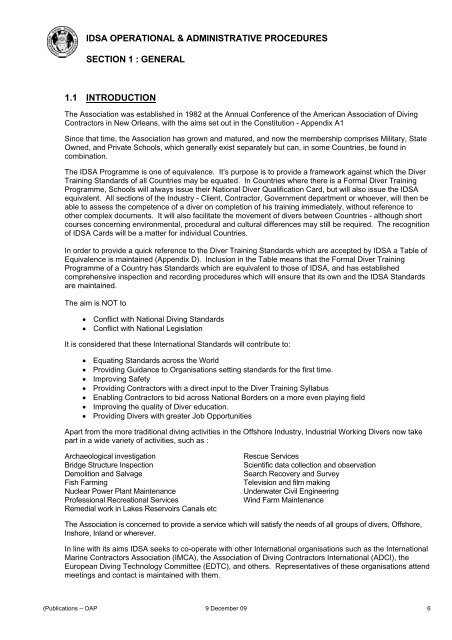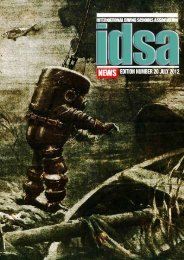International Diving Schools Association ______
International Diving Schools Association ______
International Diving Schools Association ______
You also want an ePaper? Increase the reach of your titles
YUMPU automatically turns print PDFs into web optimized ePapers that Google loves.
IDSA OPERATIONAL & ADMINISTRATIVE PROCEDURES<br />
SECTION 1 : GENERAL<br />
1.1 INTRODUCTION<br />
The <strong>Association</strong> was established in 1982 at the Annual Conference of the American <strong>Association</strong> of <strong>Diving</strong><br />
Contractors in New Orleans, with the aims set out in the Constitution - Appendix A1<br />
Since that time, the <strong>Association</strong> has grown and matured, and now the membership comprises Military, State<br />
Owned, and Private <strong>Schools</strong>, which generally exist separately but can, in some Countries, be found in<br />
combination.<br />
The IDSA Programme is one of equivalence. It’s purpose is to provide a framework against which the Diver<br />
Training Standards of all Countries may be equated. In Countries where there is a Formal Diver Training<br />
Programme, <strong>Schools</strong> will always issue their National Diver Qualification Card, but will also issue the IDSA<br />
equivalent. All sections of the Industry - Client, Contractor, Government department or whoever, will then be<br />
able to assess the competence of a diver on completion of his training immediately, without reference to<br />
other complex documents. It will also facilitate the movement of divers between Countries - although short<br />
courses concerning environmental, procedural and cultural differences may still be required. The recognition<br />
of IDSA Cards will be a matter for individual Countries.<br />
In order to provide a quick reference to the Diver Training Standards which are accepted by IDSA a Table of<br />
Equivalence is maintained (Appendix D). Inclusion in the Table means that the Formal Diver Training<br />
Programme of a Country has Standards which are equivalent to those of IDSA, and has established<br />
comprehensive inspection and recording procedures which will ensure that its own and the IDSA Standards<br />
are maintained.<br />
The aim is NOT to<br />
� Conflict with National <strong>Diving</strong> Standards<br />
� Conflict with National Legislation<br />
It is considered that these <strong>International</strong> Standards will contribute to:<br />
� Equating Standards across the World<br />
� Providing Guidance to Organisations setting standards for the first time.<br />
� Improving Safety<br />
� Providing Contractors with a direct input to the Diver Training Syllabus<br />
� Enabling Contractors to bid across National Borders on a more even playing field<br />
� Improving the quality of Diver education.<br />
� Providing Divers with greater Job Opportunities<br />
Apart from the more traditional diving activities in the Offshore Industry, Industrial Working Divers now take<br />
part in a wide variety of activities, such as :<br />
Archaeological investigation<br />
Bridge Structure Inspection<br />
Demolition and Salvage<br />
Fish Farming<br />
Nuclear Power Plant Maintenance<br />
Professional Recreational Services<br />
Remedial work in Lakes Reservoirs Canals etc<br />
Rescue Services<br />
Scientific data collection and observation<br />
Search Recovery and Survey<br />
Television and film making<br />
Underwater Civil Engineering<br />
Wind Farm Maintenance<br />
The <strong>Association</strong> is concerned to provide a service which will satisfy the needs of all groups of divers, Offshore,<br />
Inshore, Inland or wherever.<br />
In line with its aims IDSA seeks to co-operate with other <strong>International</strong> organisations such as the <strong>International</strong><br />
Marine Contractors <strong>Association</strong> (IMCA), the <strong>Association</strong> of <strong>Diving</strong> Contractors <strong>International</strong> (ADCI), the<br />
European <strong>Diving</strong> Technology Committee (EDTC), and others. Representatives of these organisations attend<br />
meetings and contact is maintained with them.<br />
(Publications – OAP 9 December 09 6




